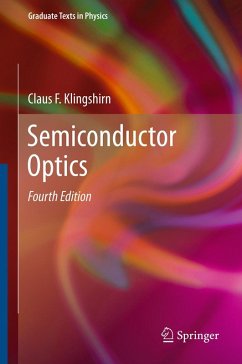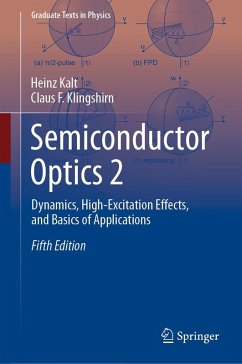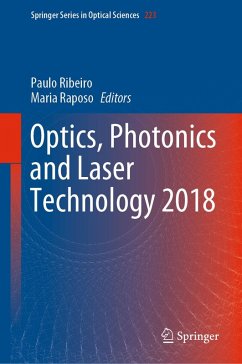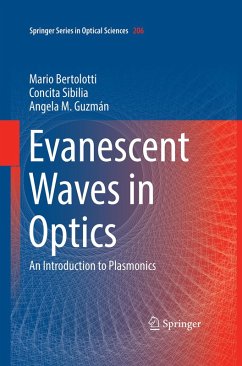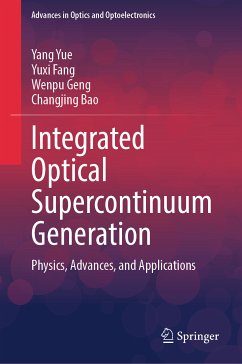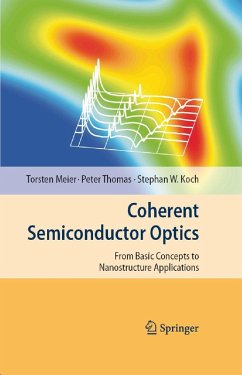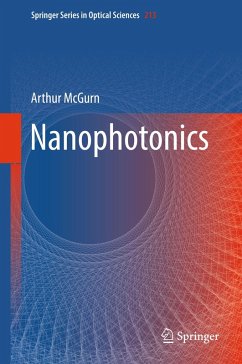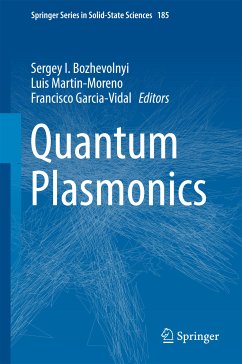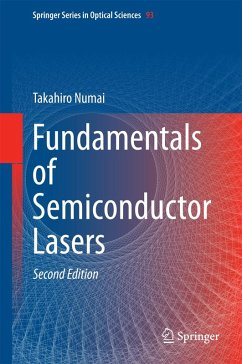
Semiconductor Optics 1 (eBook, PDF)
Linear Optical Properties of Semiconductors
Versandkostenfrei!
Sofort per Download lieferbar
80,95 €
inkl. MwSt.
Weitere Ausgaben:

PAYBACK Punkte
40 °P sammeln!
This revised and updated edition of the well-received book by C. Klingshirn provides an introduction to and an overview of all aspects of semiconductor optics, from IR to visible and UV. It has been split into two volumes and rearranged to offer a clearer structure of the course content. Inserts on important experimental techniques as well as sections on topical research have been added to support research-oriented teaching and learning. Volume 1 provides an introduction to the linear optical properties of semiconductors. The mathematical treatment has been kept as elementary as possible to al...
This revised and updated edition of the well-received book by C. Klingshirn provides an introduction to and an overview of all aspects of semiconductor optics, from IR to visible and UV. It has been split into two volumes and rearranged to offer a clearer structure of the course content. Inserts on important experimental techniques as well as sections on topical research have been added to support research-oriented teaching and learning.
Volume 1 provides an introduction to the linear optical properties of semiconductors. The mathematical treatment has been kept as elementary as possible to allow an intuitive approach to the understanding of results of semiconductor spectroscopy. Building on the phenomenological model of the Lorentz oscillator, the book describes the interaction of light with fundamental optical excitations in semiconductors (phonons, free carriers, excitons). It also offers a broad review of seminal research results augmented by concise descriptions of the relevant experimental techniques, e.g., Fourier transform IR spectroscopy, ellipsometry, modulation spectroscopy and spatially resolved methods, to name a few. Further, it picks up on hot topics in current research, like quantum structures, mono-layer semiconductors or Perovskites. The experimental aspects of semiconductor optics are complemented by an in-depth discussion of group theory in solid-state optics.
Covering subjects ranging from physics to materials science and optoelectronics, this book provides a lively and comprehensive introduction to semiconductor optics. With over 120 problems, more than 480 figures, abstracts to each chapter, as well as boxed inserts and a detailed index, it is intended for use in graduate courses in physics and neighboring sciences like material science and electrical engineering. It is also a valuable reference resource for doctoral and advanced researchers.
Volume 1 provides an introduction to the linear optical properties of semiconductors. The mathematical treatment has been kept as elementary as possible to allow an intuitive approach to the understanding of results of semiconductor spectroscopy. Building on the phenomenological model of the Lorentz oscillator, the book describes the interaction of light with fundamental optical excitations in semiconductors (phonons, free carriers, excitons). It also offers a broad review of seminal research results augmented by concise descriptions of the relevant experimental techniques, e.g., Fourier transform IR spectroscopy, ellipsometry, modulation spectroscopy and spatially resolved methods, to name a few. Further, it picks up on hot topics in current research, like quantum structures, mono-layer semiconductors or Perovskites. The experimental aspects of semiconductor optics are complemented by an in-depth discussion of group theory in solid-state optics.
Covering subjects ranging from physics to materials science and optoelectronics, this book provides a lively and comprehensive introduction to semiconductor optics. With over 120 problems, more than 480 figures, abstracts to each chapter, as well as boxed inserts and a detailed index, it is intended for use in graduate courses in physics and neighboring sciences like material science and electrical engineering. It is also a valuable reference resource for doctoral and advanced researchers.
Dieser Download kann aus rechtlichen Gründen nur mit Rechnungsadresse in A, B, BG, CY, CZ, D, DK, EW, E, FIN, F, GR, HR, H, IRL, I, LT, L, LR, M, NL, PL, P, R, S, SLO, SK ausgeliefert werden.



